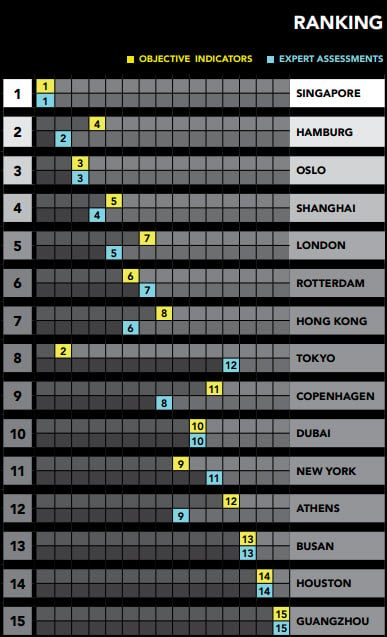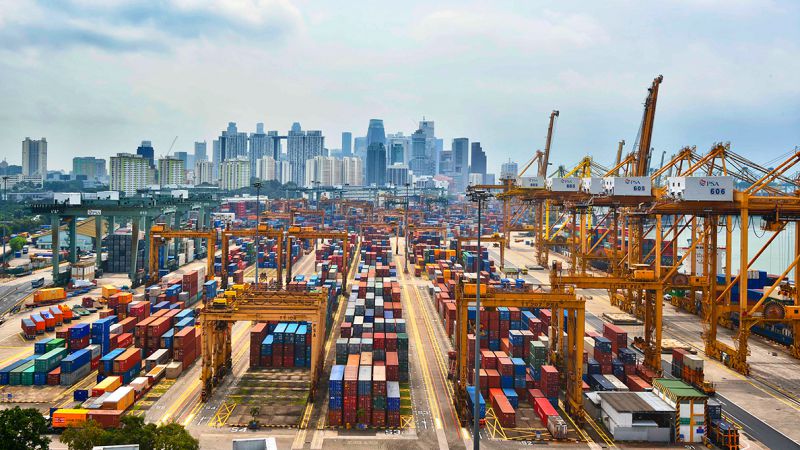Singapore has once again clinched top position in Menon’s Leading Maritime Capitals of the World Report.
The Menon Report is produced by Norwegian consultancy firm Menon Economics, and is a widely-accepted study of the world’s leading maritime capitals, looking at 24 objective indicators and garnering survey responses from more than 250 industry experts across all continents. Singapore also ranked first in the two previous editions of the report in 2012 and 2015.

Singapore was ranked number one this year in the following three categories: Shipping, Ports and Logistics, and Attractiveness and Competitiveness. The maritime nation also scored impressive results in the remaining two categories: second place in Maritime Technology and fourth place in Finance and Law. Singapore jumped three places from fifth to second position in the Maritime Technology category.

The Menon Report noted that Singapore maintained its reputation as a world leading maritime hub because of the width of the city-state’s maritime industry. In the sectors of Shipping, and Ports and Logistics, Singapore emerged first due to its strategic geographic location, its position as an important center for commercial management and as the world’s second largest port.
Singapore’s offering as an international maritime center continues to grow. While more than 140 shipping companies are represented in Singapore, new companies continue to establish a presence, with the West of England P&I (protection and indemnity) Club as a recent example.
Singapore ranked top in Overall Attractiveness and Competitiveness due to the ease of doing business and customs procedures. According to the report, seven in 10 experts regarded Singapore as one of the three most attractive cities in the world for relocating their headquarters and identified it as one of the maritime capitals most prepared and ready to adopt digitalization.
In 2016, the port’s vessel arrival tonnage increased by 6.3 percent to 2.66 billion gross tons.
Andrew Tan, Chief Executive of Maritime and Port Authority of Singapore (MPA), said, “We are not just talking about containers at our port anymore. We are also talking about the banks, insurance, P&I Clubs, classification societies, legal, arbitration, the whole ecosystem that has developed through years of conscientious and constant effort, invested in the rest of the maritime cluster in last few decades.
“Why is that important? It is important because once you establish a cluster, you have shipping groups here and mind you we now more than 140 shipping groups in Singapore. Besides major shipping lines Maersk, CMA CGM, APL, COSCO, there are many other lines that have operations in Singapore. If they are like Maersk, they call Singapore their second home because their corporate functions are also here.
“We are hoping that when the Japanese lines merge, they will also choose to locate their global operations in Singapore itself. Once you have these players here, the rest of the ecosystem also builds around these players. Which is why the P&I clubs, banks, insurers, the classification societies have established their presence in Singapore. Lloyd’s Asia is an example. They have more than a dozen syndicates in Singapore. Classification societies like DNV GL, they have a research center in Singapore. Same for Lloyd’s Register and other classification societies.”
The Singapore Registry of Ships is amongst the world’s top five largest ship registries in the world, with over 4,000 Singapore-flagged ships.
Tan said that Singapore does not want to be the world’s number one flag. “We want to be a quality flag. We don’t want to be a flag of convenience. It is easy to register a ship under the national flag but can you provide the quality service. The ship flagged under SRS have one of the lowest detention rates anywhere else in the world, because it is a quality flag and we intend to keep it that way.”
Looking five years into the future, the Menon Report predicts that Singapore will keep its position as the global leader, while Shanghai is expected to increase its importance and become the second most important maritime city. The race to be the leading city in Europe is still open, with Hamburg, Oslo, Rotterdam and London as the leading contenders. In the Middle East, India and Africa region, Dubai is the leading center. The experts predict that Dubai will continue to grow in importance and be the world’s sixth most important maritime center by 2022.
The 2017 Menon Report is available here.



















